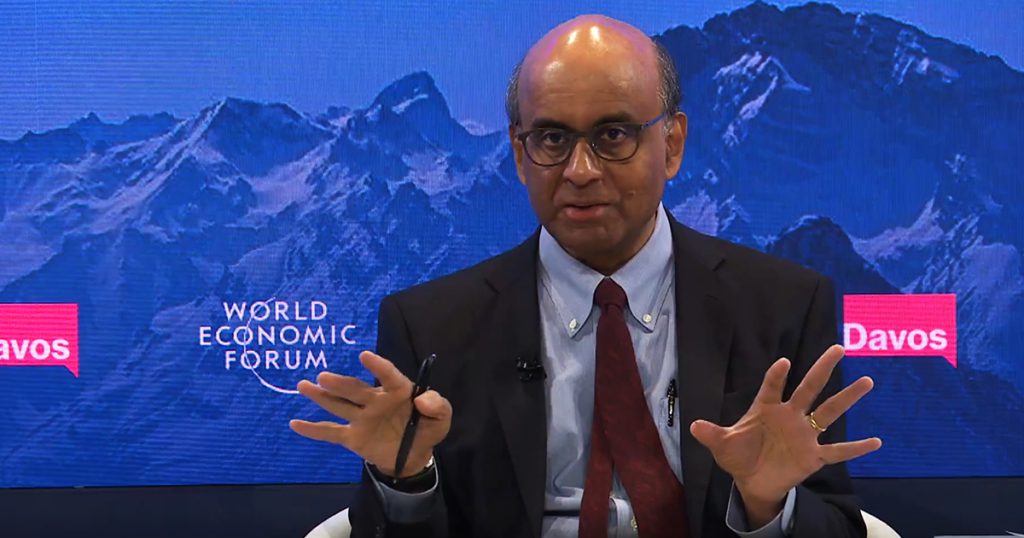Disclaimer: Any opinions expressed below belong solely to the author.
I’ve long believed that the greatest talent of one of Singapore’s most liked and respected politicians, senior minister and chairman of the Monetary Authority of Singapore (MAS), Tharman Shanmugaratnam, is his ability to get to the essence of any issue at hand and present it in just a few words.
Or, simply put: hit the nail on the head.
And he’s done it again during the panel discussion during World Economic Forum summit at Davos on January 18, this time speaking about regulating crypto space — in a way that I think hasn’t been given quite enough credit.
To regulate or not to regulate?
In my own coverage of the industry here on Vulcan Post, I’ve frequently remarked that the entire cryptoverse — and any currencies it produces — simply make no sense without regulation or outright government backing.
And the need to impose some form of legal boundaries on the space found common support among the panel members, including the CEO of Citigroup, Jane Fraser, Chairman of UBS group, Colm Kelleher and the Governor of the Bank of France, François Villeroy de Galhau.
However, what Tharman pointed out really flipped the common idea of regulating crypto on its head.
It’s typical for politicians to want to impose control on things that carry huge risks to the public. However, what if the sheer act of regulation ends up helping to legitimise the risky activity, making it inherently more dangerous to people betting their savings on things they shouldn’t be?
I think whether it’s crypto or traditional finance, you have to regulate for things like money laundering — that’s very clear.
– Minister Tharman Shanmugaratnam
But beyond that, if we’re thinking about regulating crypto the same way we regulate banks or insurance companies, I think we have to take a step back and ask a basic philosophical question: does that legitimise something that is inherently, purely speculative, and in fact slightly crazy?
In other words, what if the cure is worse than the disease? It’s a real risk that isn’t spoken about.
And as the chairman of MAS, Tharman knows the complexity of the issue first-hand.
Despite the fact that MAS has imposed strict licensing requirements for businesses offering crypto-related services in the city-state, it was not enough to protect everyone from the risks of the highly volatile industry operating in largely borderless internet — as the bankruptcy of Three Arrows Capital or the collapse of FTX have shown.
There’s only so much that regulators can do and it’s made even harder by the fundamental unpredictability that comes with a new technology that does not conform to standard ways of doing things.
Lawmakers face an unenviable task of balancing the risk and rewards from innovation, trying to protect millions of people while encouraging productive technological progress.
Too many rules may discourage investment, but too few may lead to the ruin of people already targeted by unscrupulous scammers in many other ways.
What would Tharman do?
Are we better off just providing ultra-clarity that it’s an unregulated market and if you go in you go in at your own risk?
… We have to regulate a segment of the business (like regulated stable coins with full backing et cetera), but trying to regulate everything is going to be a never-ending game, and I’m not sure it’s the right way to go.
– Minister Tharman Shanmugaratnam
In other words, what Tharman proposes is freedom with disclaimers, warnings and education for individual customers.
However, this liberty would extend only to the borders of traditional finance.
In essence, as long as crypto businesses do not want to offer services typical of traditional banks, they and their customers operate at their own risk (perhaps with some exceptions applicable to backed assets, stable coins et cetera, such as companies making certain claims about what they offer).
But the moment they want to cross the boundary into traditional financial services, they would simply fall under existing rules that apply to banks and other financial institutions — no special treatment.
If crypto companies would like to do things that traditional finance is doing, you apply exactly the same regulations to them (regarding liquidity, reserves et cetera), under one regulatory system.
– Minister Tharman Shanmugaratnam
This, frankly speaking, is a beautifully simple cut to the Gordian knot that the topic of regulating crypto has become in the past two years.
Essentially, then, few new rules are really needed.

Aside from preventing criminal activity and ensuring that businesses don’t make unfounded claims, regulatory environment for any service that aims to compete with TradFi is already here.
It just has to be extended to these digital businesses when they want to offer deposits, loans, trading et cetera.
Meanwhile, everything else is just a gamble you have to bear the risks of. If you want to dump a million bucks on an image of a drunken ape, it’s on you.
Featured Image Credit: World Economic Forum










